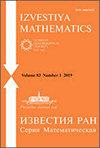一般的傅里叶系数和收敛性
IF 0.9
3区 数学
Q2 MATHEMATICS
引用次数: 4
摘要
为了使有界变分函数的傅里叶系数满足Men 'shov-Rademacher定理的假设,我们找到了在某种意义上最可能被标准正交系统的函数所满足的充分条件。我们还证明了一个定理,即每个系统都包含一个子系统,其中有界变分函数的傅里叶系数满足这些假设。所得结果补充并推广了[1]中的相应结果。本文章由计算机程序翻译,如有差异,请以英文原文为准。
General Fourier coefficients and convergence almost everywhere
We find sufficient conditions which are in a sense best possible that must be satisfied by the functions of an orthonormal system in order for the Fourier coefficients of functions of bounded variation to satisfy the hypotheses of the Men’shov–Rademacher theorem. We also prove a theorem saying that every system contains a subsystem with respect to which the Fourier coefficients of functions of bounded variation satisfy those hypotheses. The results obtained complement and generalize the corresponding results in [1].
求助全文
通过发布文献求助,成功后即可免费获取论文全文。
去求助
来源期刊

Izvestiya Mathematics
数学-数学
CiteScore
1.30
自引率
0.00%
发文量
30
审稿时长
6-12 weeks
期刊介绍:
The Russian original is rigorously refereed in Russia and the translations are carefully scrutinised and edited by the London Mathematical Society. This publication covers all fields of mathematics, but special attention is given to:
Algebra;
Mathematical logic;
Number theory;
Mathematical analysis;
Geometry;
Topology;
Differential equations.
 求助内容:
求助内容: 应助结果提醒方式:
应助结果提醒方式:


